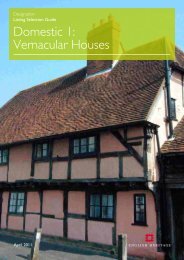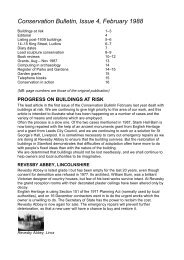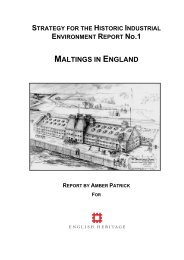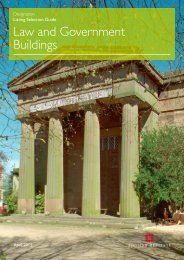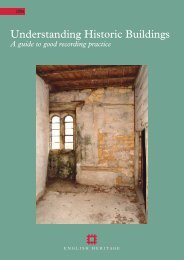The Brewing Industry: Archive Report | PDF - English Heritage
The Brewing Industry: Archive Report | PDF - English Heritage
The Brewing Industry: Archive Report | PDF - English Heritage
Create successful ePaper yourself
Turn your PDF publications into a flip-book with our unique Google optimized e-Paper software.
website http://newspapers.bl.uk/blcs/ provides a limited amount of free access, while further access can<br />
be paid for by individual subscriber and the whole site is available free of charge in some public and other<br />
libraries.<br />
Note that archives of a local brewery may not always be held locally, and even if there are holdings,<br />
they may not yet have been catalogued. Contact local repositories directly to enquire about access to<br />
specific archives. <strong>The</strong>re may also be material located in repositories abroad. Of course, many business<br />
records are still held by operating breweries. Conversely, former breweries may have virtually no archival<br />
material at all. In this case the use of other sources such as local newspapers, obituaries, directories and<br />
census returns may be necessary. <strong>The</strong> article by Peter Mathias, <strong>Brewing</strong> archives: their nature and use (1990),<br />
provides an excellent introduction to the scope and potential pitfalls of research into the brewing industry.<br />
See also Gutzke (2005) for guidelines on writing historical articles related to the brewing industry.<br />
7 Dealing with archival problems resulting from brewery closures<br />
Some brewery closures take place over a long period, and it should then be possible to plan ahead, in<br />
conjunction with the relevant local depository (see section 8), if the company concerned wishes to deposit<br />
archival material. If possible, build a relationship with the company over the long term, with the aim of<br />
ensuring that as much archival material is safely deposited well before closure. In an emergency, when a<br />
plant closure is imminent and archives are endangered, the first move is to attempt to establish relations<br />
with the company, in order to assist them in dealing with what they may perceive only as a short-term<br />
space problem. Try to obtain access to the archive material, and make an initial survey of what is<br />
particularly important; it may be possible to obtain help from a local repository. Even at this late stage it<br />
may be worth trying to encourage the company to gift or loan at least some of their material to a<br />
depository, rather than simply get rid of it as waste. If the company will allow access and removal of<br />
material, but nothing else by way of support for moving the archive, then the Brewery History Society or a<br />
local repository may be able to offer assistance. As the rescue of the Allied Breweries <strong>Archive</strong> (see section 3)<br />
showed, it is an extremely time-consuming and costly task to sort, pack and disperse a large amount of<br />
material when a deadline is in sight.<br />
8 Guidance on depositions<br />
<strong>The</strong> Business <strong>Archive</strong>s Council’s website www.businessarchivescouncil.org.uk is a useful source of<br />
information for potential depositors of records. It advises that many businesses may not realise that their<br />
historical records can be a valuable research resource; records can sometimes be seen simply as taking up<br />
valuable office or warehouse space. Most archive repositories maintain policies of free public access. Any<br />
deposit of records can be made either as a gift or as a long-term loan, although most repositories prefer the<br />
records to be gifted, avoiding future ownership and copyright issues. <strong>The</strong> chances of a repository accepting<br />
a collection are greater if it is comprehensive, that is it has not been ‘cherry-picked’ by the company for<br />
items of obvious interest or value. A repository may have to be tempted to accept a collection by the offer<br />
of exceptionally interesting or rare items. Most local repositories have websites that carry information for<br />
depositors, setting out the kind of records in which they are interested, their geographical area of collection<br />
and their terms of agreement for gifting or loans. <strong>The</strong>y may also offer advice as to which items are of<br />
historical importance. A searchable list of local repositories - the ARCHON Directory - may be found on the<br />
National <strong>Archive</strong>s website at www.nationalarchives.gov.uk/archon/default.htm<br />
9 <strong>Brewing</strong> artefacts<br />
Although paper archives are well served by the various record offices, the situation is not as good for<br />
artefacts; there is no national brewing museum. Little brewing equipment appears to currently be<br />
preserved by the national museums, although many items from the Whitbread <strong>Archive</strong> were donated to<br />
museums in 2001. Until its closure in June 2008, the Coors Visitor Centre (previously Bass Museum of<br />
<strong>Brewing</strong>) at Burton upon Trent was in effect England’s only national brewing museum. <strong>The</strong> site is due to<br />
reopen in April 2010 as the National Brewery Centre.<br />
3







